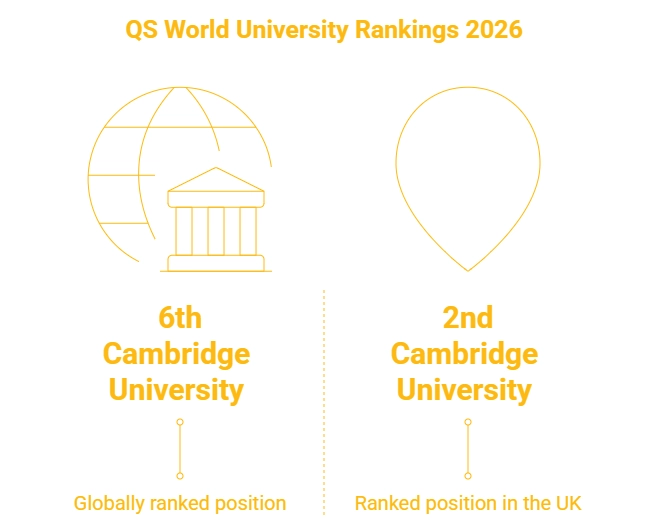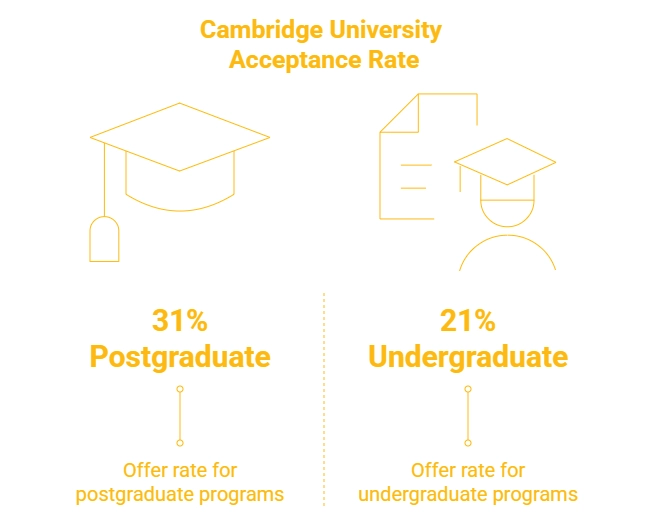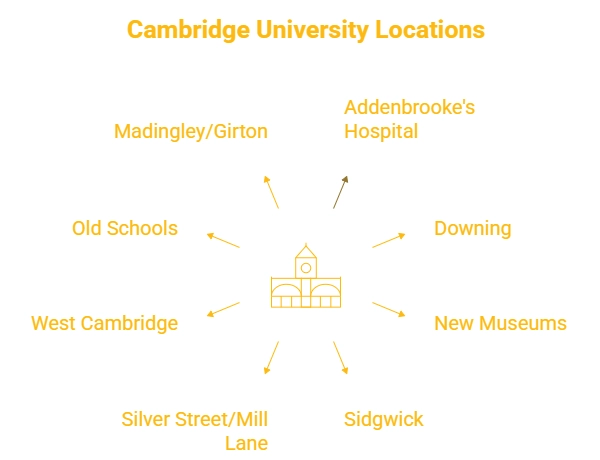Study in UK
Don't know what to do?
Get Free Counseling
Why Study at Cambridge University?
Founded in 1209, Cambridge University is among the oldest universities still running. Ranked as a top-five global institution, its standing shows its great faculty, collaborative research, and history of important academic work. UCAS data places it in the top three for research quality. Cambridge has a £2.62 billion endowment and a £2.24 billion budget (2023/24), which supports excellent facilities and education.
Cambridge University World QS Ranking
Cambridge University has consistently maintained its position. According to the QS World University Rankings 2026, it holds the 6th position globally, which confirms its good academics and global name. In the UK, it is ranked 2nd, showing its popularity among the students from both the UK and other countries.

Cambridge University Acceptance Rate
Getting an admission in Cambridge University is highly competitive. About 21% of undergraduate applicants get an offer, which is roughly 1 in 5. For postgraduate programs (both taught and research), the offer rate is about 31%.

*Need assistance to study in UK? Y-Axis is here to assist you in all the ways.
Cambridge University Campuses
Cambridge has several locations, such as:
- Addenbrooke’s Hospital, Downing, New Museums, Sidgwick, Silver Street/Mill Lane, West Cambridge, Old Schools, and Madingley/Girton.
- Students account for about 20% of Cambridge's population of about 145,674 residents (in 2021).

This close relationship between the university and the city helps create a lively academic and social atmosphere, since many resources are nearby.
Courses offered at Cambridge University
Cambridge has 31 autonomous colleges and a lot of academic choices:
- About 30 undergraduate courses cover over 65 areas.
- There are about 300 graduate programs across different departments.
- More than 38 subjects are ranked in the global top 10.
Courses include fields like Humanities, Sciences (including Mathematics, Engineering, and Medicine), Social Sciences, Architecture, Law, and Business. Cambridge's education is strong because of its varied courses and focused teaching in each college.
Cambridge University Fees and scholarships
|
Level |
Annual Tuition Fee (GBP) |
|
Undergraduate |
£27,024 – £70,554 |
|
Postgraduate |
£24,700 – £69,000 |
Note: Costs vary significantly by course and college fees. Living costs are about £14,600 each year.
Scholarships
Cambridge gives awards such as:
- Gates Cambridge Scholarships (for graduate students)
- Jardine Scholarship (for undergraduates at Oxford and Cambridge)

These show Cambridge supports students based on merit and promotes diversity.
Cambridge University Accommodation Options for International Students
Cambridge guarantees college-owned accommodation for almost all undergraduates for at least three years
Girton College details:
- There are 348 rooms available for the full academic year (38–39 weeks).
- All undergraduate students pay the same weekly rate.
- Students who get a Bursary also receive a discount of about £20 per week on housing costs.
Living in college-owned accommodation puts students close to classes and fosters a sense of community. After their first few years, many students choose to move into private housing.
Cambridge University Application process
Steps for Undergraduate Programs
Step 1: Applications should be submitted through UCAS by mid-October for entry in October.
Step 2: Applicants must fill out the My Cambridge Application, which includes choosing a college and course, and providing personal details.
Step 3: Some subjects like Arts and Law, may require submission of written work or a portfolio.
Step 4: Depending on the course, applicants may need to attend an interview or complete an admissions assessment such as STEP, BMAT, or TSA.
Step 5: Offers are usually given in winter and are conditional, depending on A-level or IB results.
Step 6: Admission is confirmed once the required conditions are met after the results are released.
Steps for Postgraduate Programs
- Submit your application through Cambridge's Graduate Portal, adhering to the instructions from your chosen department.
- You'll generally need to provide academic records, references, a statement explaining your goals, and scores from tests like IELTS or TOEFL.
- Make sure to visit the department's website to find out what else you need and when the application is due.
Why Choose Y-Axis?
- Professional Advice for UK Applicants: Tailored assistance for UK students submitting applications to universities in Europe.
- End-to-End Application Support: Everything under one roof, from choosing a university to applying for a visa.
- Scholarship Help: We assist you in locating and submitting applications for the top scholarships for which you qualify.
- Preparation and Review of Documents: Proper documentation is necessary to prevent application delays or rejections.
- Trusted by Thousands: More than 1 million customers have used Y-Axis to successfully complete their international education.
Testimonials
Frequently Asked Questions
